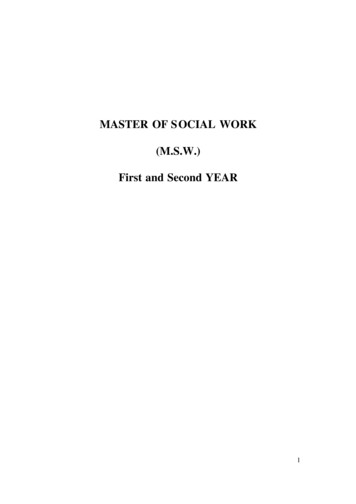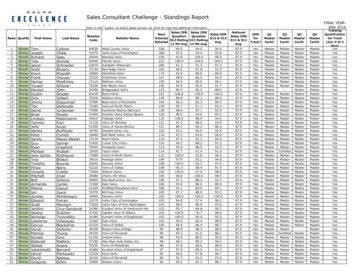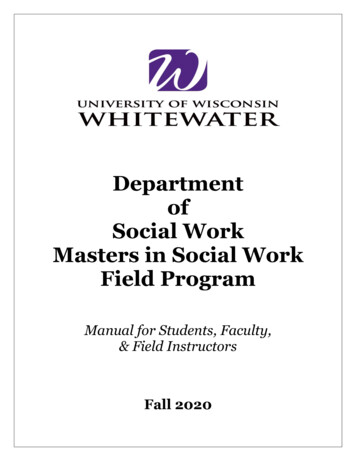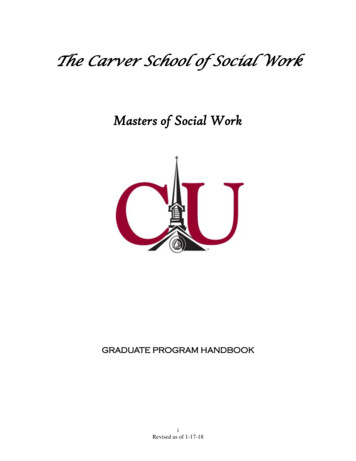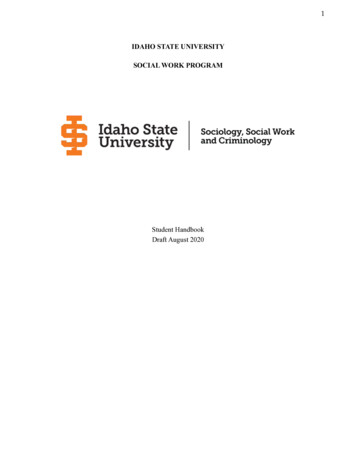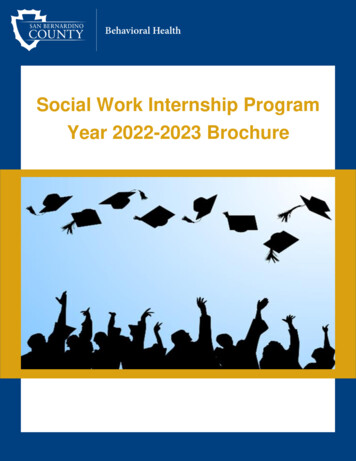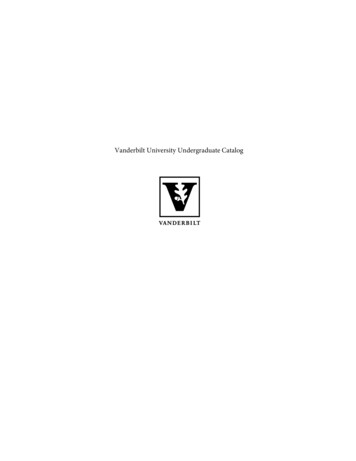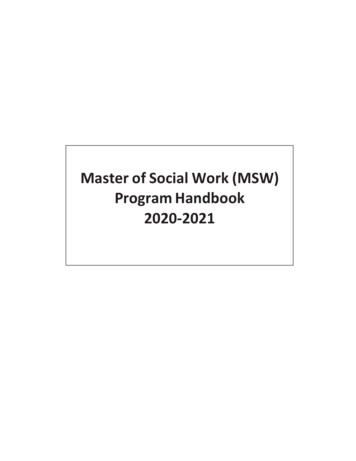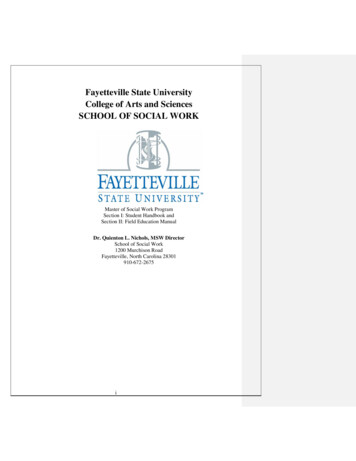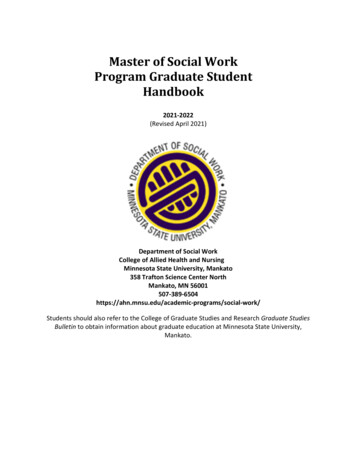
Transcription
Master of Social WorkProgram Graduate StudentHandbook2021-2022(Revised April 2021)Department of Social WorkCollege of Allied Health and NursingMinnesota State University, Mankato358 Trafton Science Center NorthMankato, MN grams/social-work/Students should also refer to the College of Graduate Studies and Research Graduate StudiesBulletin to obtain information about graduate education at Minnesota State University,Mankato.
Page iWelcome to the Department of Social WorkDear MSW Students:We are pleased that you have selected Minnesota State University, Mankato to pursue yourMaster of Social Work degree. As a Council on Social Work Education (CSWE) accredited MSWdegree-granting program, we are committed to providing you with a high-quality social workeducation that will prepare you for advanced generalist practice with an emphasis on rural andsmall communities.We are pleased to present you with your MSW Program Graduate Student Handbook. Pleaseread your handbook thoroughly. You will find information that outlines your rights, as well asyour obligations as a student. We are aware that policies and procedures sometimes need tochange or be amended as the program moves forward. We will consult with you and keep youinformed regarding any proposed changes to policies or procedures that have bearing uponyour education in the MSW Program.The Social Work faculty and staff want you to be successful in your academic endeavors andencourage you to seek guidance and clarification if you have questions or concerns regardingthe program. You have been assigned an academic advisor to provide consultation through theMSW program. We strongly encourage you to work with your advisor to help with academicand professional issues.We wish you great success as a graduate student in our MSW program.Kimberly Zammitt, PhD, MSW, LICSWMSW Program DirectorMSW Program Graduate Student Handbook 2021-22 Rev. 04/2021
P a g e iiTable of ContentsWelcome to the Department of Social Work . 1Disclaimer . 5Social Work Faculty and Staff Directory . 1CSWE Accreditation . 4Social Work Examination and Licensure . 4MSW Program. 6MSW Program Goals . 6Competencies and Behaviors . 7MSW CURRICULUM . 14Requirements for the MSW Degree . 14Curriculum Plan – Traditional Program . 14Curriculum Plan – Advanced Standing Program . 16MSW Program Course Descriptions . 17MSW Program Elective Courses . 22Clinical Knowledge Content . 25MSW PROGRAM POLICIES. 26General Statement . 26Statement of Non-Discrimination . 26Access for Students with Disabilities Policy . 27Admission Related Policies & Procedures . 28Advanced Standing Policy . 28Credit for Life Experience or Previous Work Experience Policy . 28Enrollment in required MSW courses . 28International applicants for whom English is not their first language. 29Application for readmission to the MSW Program following withdrawal or dismissal . 29Course Transfer/Substitution Policy and Procedures . 29Transfer/Substitution Procedure: Generalist Year Courses or Elective Taken Before Beginning the MSW Program . 30Transfer/Substitution Procedure: Elective Course Completed After Beginning the MSW Program . 31Advisement Policy .32MSW Program Graduate Student Handbook 2021-22 Rev. 04/2021
P a g e iiiDelay of Admission to the Program . 33Leave of Absence . 33MSW Program Listserv . 35Department of Social Work Listserv . 35MavMail Use . 36Student Mailboxes . 37Distraction and Technology Use Policy. 37Student Responsibilities Policy . 40Professional and Ethical Behavior . 40Potential Barriers to Professional Service . 40Procedure for Non-compliance with the Student Responsibilities Policy . 41Conduct Requiring Immediate Dismissal from the MSW Program. 42Grievance and Appeal Process . 43Criminal Background Check Policy . 43Chemical Sensitivity Policy . 45Academic Honesty Policy and Procedures . 45Violation of the Academic Honesty Policy: MSW Program Action . 46Violation of the Academic Honesty Policy . 47Office of Student Conduct Action . 47Elective Requirement Policy and Procedures . 48Scholastic Standards Policy . 49College of Graduate Studies and Research Scholastic Standards . 49MSW Program Scholastic Standards Policy and Procedures . 50Academic Warning, Probation, Dismissal . 50Right to Appeal Dismissal from the MSW Program . 51Graduation and Academic Warning, Probation and Dismissal . 52Incomplete Grades Policy . 52In-Progress Grades Policy . 52APA Style Writing Guidelines . 53Appeal Policy and Procedures . 55Grade Appeal Procedure . 55Grievance against the MSW Program . 58MSW Credit-Earning Out-of-Region and International Coursework Policy . 59MSW Program Graduate Student Handbook 2021-22 Rev. 04/2021
P a g e ivII. General Policies regarding Out-of-region and International Coursework . 59III. Social Work Practicum (SOWK 615/625 and SOWK 665/675) . 60MSW Program Assessment . 64Applying for Graduation, University Commencement, and Department Summer Recognition Celebration . 66Department Summer Recognition Celebration . 66Campus Services . 67Bookstores . 67Campus Security . 67Financial Aid and Graduate Assistantships . 68Identification Card . 68Information & Technology Services . 68International Student Office . 70Office of Accessibility Resources . 70Office of Institutional Diversity . 70Lesbian, Gay, Bisexual, Transgender (LGBT) Center . 70Non-Traditional Student Support Program . 71Women’s Center . 71Memorial Library . 72Counseling Center . 72Student Health Services. 72Weather/Class Cancellation/University Closing . 73Student Service & Professional Enhancement Opportunities . 74Association of Baccalaureate Social Work Program Directors (BPD). 74Council on Social work Education (CSWE) . 74Minnesota Social Service Association (MSSA) . 74National Association of Social Workers (NASW). 75Social Work Day at the Capitol . 75Phi Alpha Eta Chapter – Honor Society . 75Social Work Club . 76Department of Social Work Scholarships . 76MSW Program Graduate Student Handbook 2021-22 Rev. 04/2021
Page vFunding for Student Professional Development and Travel . 76APPENDIX A. Forms . 77Course Transfer/Substitution Form . 78Delay of Admission Form. 79Leave of Absence Form . 80Approval for Continuation Form . 81Travel Fund Request Application Form . 82MSW Program Graduate Student Handbook 2021-22 Rev. 04/2021
Page vDisclaimerThis document represents the 2019-20 edition of the MSW Program Graduate StudentHandbook. The Department reserves the right to review existing policies and revise, repeal, anddraft new policies as is warranted in order to be in compliance with federal, state, university,College of Graduate Studies and Research, and CSWE policy, to ensure effective administrationof the MSW program in delivering a high-quality social work education, and to ensure theequitable treatment of all students. All policy changes are effective immediately, unlessotherwise noted. Students will be notified electronically via the Department webpage andlistserv of all policy changes. Program information, program policies, and procedures that havebeen approved by the MSW Program faculty are noted by the word “adopted” and the date.MSW Program Graduate Student Handbook 2021-22 Rev. 04/2021
Page 1Social Work Faculty and Staff DirectoryFaculty profiles are available on the Department website ork/about/faculty-andstaff/NameTelephone OfficeEmailKimberly Zammitt, Assoc. Professor389-1219 WH 342 kimberly.zammitt@mnsu.eduMSW Program Director, MSW Title IV-E Child Welfare CoordinatorJennifer Parker, MSW, LICSWMSW Field Education Director389-1271WH 344 jennifer.parker@mnsu.eduDebra Gohagan, Professor389-1669 TN 358B debra.gohagan@mnsu.eduDepartment Chair, BSSW Title IV-E Child Welfare CoordinatorMarie WorrellAdministrative Assistant389–6504TN 358 social-work@mnsu.eduRoss Aalgaard, Assoc. Professor389-1269WH 340 ross.aalgaard@mnsu.eduJennifer Andrashko, Asst. Professor389-5671WH 343 jennifer.andrashko@mnsu.eduDavid Beimers, Assoc. Professor389-6190TBDLaura Benesch, MSW, LICSWBSSW Field Education Director389-1253WH 340 ine Black-Hughes, Assoc. Professor 389-5670TN 334 christine.black-hughes@mnsu.eduKofi Danso, Assoc. Professor389-1148WH 347 kofi.danso@mnsu.eduNancy Fitzsimons, Professor389-1287WH 345 nancy.fitzsimons@mnsu.eduPaul Mackie, Professor389-6335TBDJessica Sky Smith, Asst. Professor389-5084WH 337 jessica.smith@mnsu.eduLaurie Strunk, Assoc. Professor389-6192WH 341 laurie.strunk@mnsu.edupaul.mackie@mnsu.eduCollege of Allied Health and NursingKristine Retherford, Dean389-6315MF 124kristine.retherford@mnsu.eduMSW Program Graduate Student Handbook 2021-22 Rev. 04/2021
Page 2Bonnie Hanson, Asst. to DeanPeggy Borgmeier, Admin. Asst.389-5641389-1254MF 124MF SW Program Graduate Student Handbook 2021-22 Rev. 04/2021
Page 3MSW Program Graduate Student Handbook 2021-22 Rev. 04/2021
Page 4CSWE AccreditationThe MSW Program is accredited by the Council on Social Work Education (CSWE). The initialaccreditation was from the academic year 2006-2007 to October 2014. The MSW programunderwent reaffirmation of accreditation in 2020 and is presently accredited through October2028.Revised: May 3, 2021Social Work Examination and LicensureThe Association of Social Work Boards (ASWB) administers bachelors, masters, advancedgeneralist and clinical social work examinations recognized by state licensing boards. States areresponsible for creating and administering licensing laws for social work practice at theundergraduate and graduate levels. In general, social workers must graduate from a CSWEaccredited program in order to be eligible to take the requisite bachelors, masters, advancedgeneralist, or clinical social work examination. Graduates from the MSW program at MinnesotaState, Mankato will be eligible to take the masters examination upon completion of theprogram and to apply for licensure as an LGSW in Minnesota. For more information about thesocial work examination, contact the Association of Social Work Boards athttp://www.aswb.orgThe Minnesota Board of Social Work (BOSW) establishes and enforces the professionalstandards of social work practice in the state of Minnesota. The practice of social work, asspecified in Minnesota State Statutes is subject to change by the Legislature annually.See Chapter 148E. Board of Social Work Practice for more information. id 148EMajor Board FunctionsEstablish and enforce minimum standards of licensure and continuing competency for socialworkers.§ Approve applicants for the licensure examination§ Issue and renew licenses§ Establish, implement, and enforce standards for supervision§ Review and approve continuing education reported by licensees§ Review and approve continuing education provider applicationsEstablish and enforce minimum standards of ethical practice for social workers.§ Receive and investigate complaints against social workers§ Take corrective or disciplinary action as deemed necessary to protect the public§ Monitor licensees who are under disciplinary orders and corrective action agreementsMSW Program Graduate Student Handbook 2021-22 Rev. 04/2021
Page 5Provide information to applicants and licensees about examination, licensure and renewalrequirements, and ethical standards of practice.§ Respond to inquiries from applicants and licensees§ Make presentations to social work students in accredited social work programs atcolleges and universities throughout the state§ Attend social work professional conferences to distribute written information, makepresentations, and answer questionsProvide information to the public.§ Disseminate information to the public on actions taken by the board§ Respond to requests for data§ Educate the public about the board’s responsibilities, including how to register acomplaint and how the complaint process worksVerify licensure status of social workers to employers, credentialing agencies, insuranceagencies, and the public.§ Respond to inquiries§ Provide written verification(Note: Preceding content taken directly from the MN BOSW webpage, 2015.)Students graduating from the MSW program are eligible for licensure at the introductorymaster’s level to practice as a Licensed Graduate Social Worker (LGSW) in Minnesota. Studentswishing to practice social work in other states should contact the Board of Social Work in therespective state to determine licensure requirements. There are two advanced levels oflicensure in Minnesota for individuals with an MSW degree or doctorate degree in social work:1) Licensed Independent Social Worker (LISW) and 2) Licensed Independent Clinical SocialWorker (LICSW). Go to the MN BOSW webpage page to learn about requirements for licensureat the advanced levels. Note that licensure is the responsibility of the licensee, not theireducational program or employer. ALL of those who graduate with a degree in social workshould obtain licensure even if their job title is not “social worker.” For more information aboutlicensure to practice social work in Minnesota, contact the Minnesota Board of Social Work.Minnesota Board of Social Work2829 University Ave SE, Suite 340Minneapolis, MN 55414-3239(612) 617-2100; (888) 234-1320; FAX (612) 617-2103Hearing/Speech Relay: (800) 627-3529Email: .mn.us/Revised: March 7, 2014MSW Program Graduate Student Handbook 2021-22 Rev. 04/2021
Page 6MSW ProgramMission StatementThe mission of the Master of Social (MSW) Program is to empower students to be ethical andculturally responsive advanced generalist social workers who are champions and advocates forsocial justice, economic justice, and the equality of human rights at all system levels. Located inMankato, a mid-size community that serves as a regional hub for surrounding small and ruralcommunities, we build on strengths and address the social, economic, and cultural challengesconfronting small and rural communities. We are also committed to developing social workleaders with an awareness of historical and contemporary social, economic, and cultural issuesin a broader and global context.Adopted: March 1, 2017MSW Program GoalsMSW Program will:1. Prepare advanced generalist social workers that understand and identify with thevaluesand ethics that serve to guide culturally responsive social work practice [C 1].2. Prepare advanced generalist social workers that are able to critically and differentiallyapply the knowledge, theories, values, and skills required to engage in researchinformed practice and planned change (i.e. engagement, assessment, intervention, andevaluation) at all system levels, emphasizing the small and rural community context [C 4,6, 7, 8, 9].3. Prepare advanced generalist social workers who build upon strengths, are committedtoaffirming diversity and difference in practice, and are advocates for the advancementof human rights and social and economic justice at all system levels [C 2, 3].4. Prepare advanced generalist social workers as leaders who critically analyze, respond to,and shape the practice context, emphasizing rural and small communities [C 7].5. Prepare advanced generalist social workers who engage in policy practice to delivereffective social work services and advance social and economic well-being [C5].6. Model and promote the core values of competency and service through life-longlearning, scholarship, community involvement, and the promotion of the social workprofession, spanning local to global communities [C 1].Adopted: June 9, 2006; Revised and Adopted: January 7, 2008; Revised and adopted: March2012; Revised and adopted: April 19, 2017MSW Program Graduate Student Handbook 2021-22 Rev. 04/2021
Page 7Competencies and BehaviorsCSWE EPAS 2015COMPETENCIES AND BEHAVIORSCompetency 1: Demonstrate Ethical and Professional BehaviorSocial workers understand the value base of the profession and its ethical standards, as well asrelevant laws and regulations that may impact practice at the micro, mezzo, and macro levels.Social workers understand frameworks of ethical decision-making and how to apply principlesof critical thinking to those frameworks in practice, research, and policy arenas. Social workersrecognize personal values and the distinction between personal and professional values. Theyalso understand how their personal experiences and affective reactions influence theirprofessional judgment and behavior. Social workers understand the profession’s history, itsmission, and the roles and responsibilities of the profession. Social Workers also understandthe role of other professions when engaged in inter-professional teams. Social workersrecognize the importance of life-long learning and are committed to continually updating theirskills to ensure they are relevant and effective. Social workers also understand emerging formsof technology and the ethical use of technology in social work practice. Social workers:Generalist Year Behaviors Make ethical decisions by applying the standards of the NASW Code of Ethics, relevantlaws and regulations, models for ethical decision-making, ethical conduct of research,and additional codes of ethics as appropriate to context; Use reflection and self-regulation to manage personal values and maintainprofessionalism in practice situations; Demonstrate professional demeanor in behavior; appearance; and oral, written, andelectronic communication; Use technology ethically and appropriately to facilitate pra
MSW Program Graduate Student Handbook 2021-22 Rev. 04/2021 CSWE Accreditation The MSW Program is accredited by the Council on Social Work Education (CSWE). The initial accreditation was from the academic year 2006-2007 to October 2014. The MSW program underwent reaffirmation of accreditation in 2020 and is presently accredited through October 2028.
